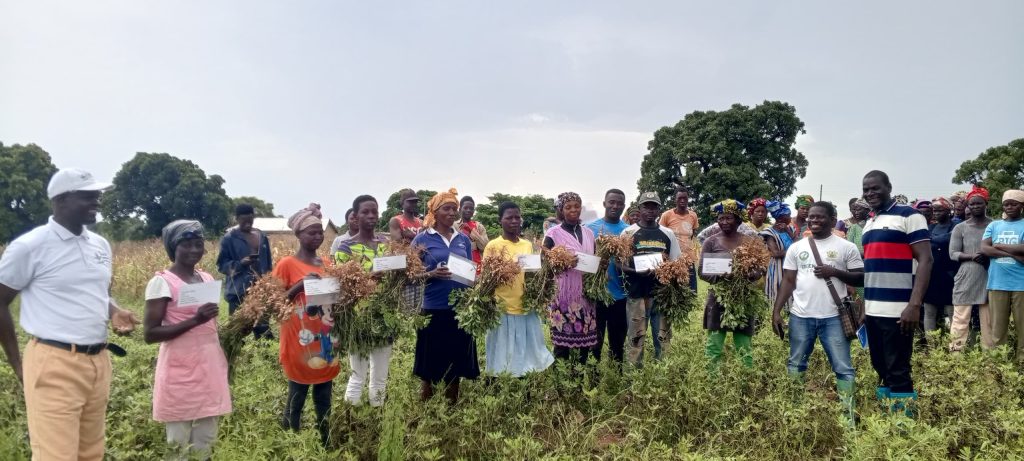By Gilbert Azeem Tiroog
Awaaredoni (U/E), Oct 23, GNA – Farmers at Awaaredoni community in the Talensi District of the Upper East Region have lauded the Council for Scientific and Industrial Research-Savannah Agricultural Research Institute (CSIR-SARI) as the first trials of its SARI Nut2 (groundnut) and Wandata (maize variety) record high yields.
At a farmer demonstration and harvest exercise in the community, a comparative study between SARI Nut2 and the local Chinese variety revealed that SARI Nut2 produced not only higher yields but also larger pods, and this, according to the farmers, showcased its potential to enhance local agriculture productivity.
This followed a field trial conducted on the same plot of land by CSIR-SARI in collaboration with the Talensi Directorate of Agriculture (DOA), where the two varieties were given the same treatment of aflasafe, control, and aflasafe plus fertiliser, grown separately on the same piece of land.
Madam Celestina Adoku, a farmer, noted that not only had SARI Nut2 recorded higher yield than the local Chinese variety, which has been patronised over the years, the pods of the SARI Nut2 were also bigger than the Chinese variety.
“We participated throughout the process and can testify that given the same treatment in all three instances, the SARI Nut2 gives higher yield, with bigger pods than the Chinese variety, which we have been using over the years, and as a farmer, I will adopt the SARI Nut2 going forward,” she said.
Mr. Mark Azure, another farmer, indicated that “with the SARI Nut2, one can count up to 15 or 20 pods in one plant, unlike the Chinese variety that one can hardly get beyond 10 pods and CSIR- SARI must be commended for this production option.”
Dr Muntari Abubakar, a research scientist at CSIR-SARI, noted that the demonstration was to see how the use of technology could be used to reduce aflatoxin contamination, which continue to be a problem with groundnut and sometimes maize, and also how yields could be improved.

“Though we are promoting our variety of groundnut, which is SARI Nut2, and maize (Wandaata), we are also looking at how we can address the associated problems, like aflatoxin, which affects the market value of the produce and the health of the consumer,” he said.
That, the scientist indicated, necessitated the application of aflasafe and also in combination with fertiliser to see how it could prevent the production of aflatoxin and improve the yield of the crops.
Dr Abubakar said having harvested the crops, the next step is for the institute to carry out tests on the produce to determine the presence of aflatoxin or otherwise at the lab and make recommendations for the adoption of the varieties.
Dr Issah Sugri, a senior Research Scientist and post-harvest specialist at CSIR-SARI, said the institute’s commitment to research and innovation would continue to benefit local farmers and foster hope for improved agriculture outcomes and economic growth and urged the farmers to adopt the improved varieties.
Mr. Mathew Sulemana, the Talensi District Director of Agriculture, said the intervention by CSIR-SARI with the new varieties was timely given several complaints by farmers of low yield and higher infestation when the local varieties were used.
He commended the research institute and called on farmers to adopt the new varieties for improved yields and possibly no infestation.
GNA